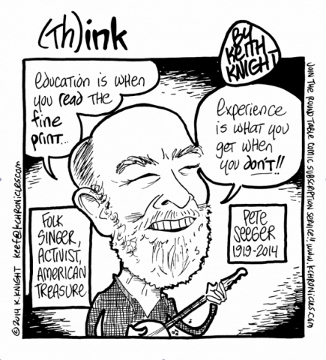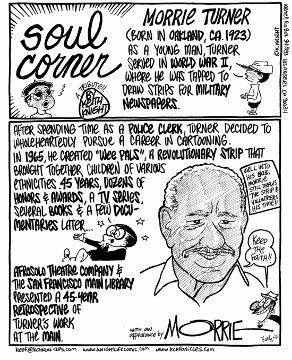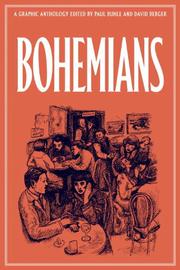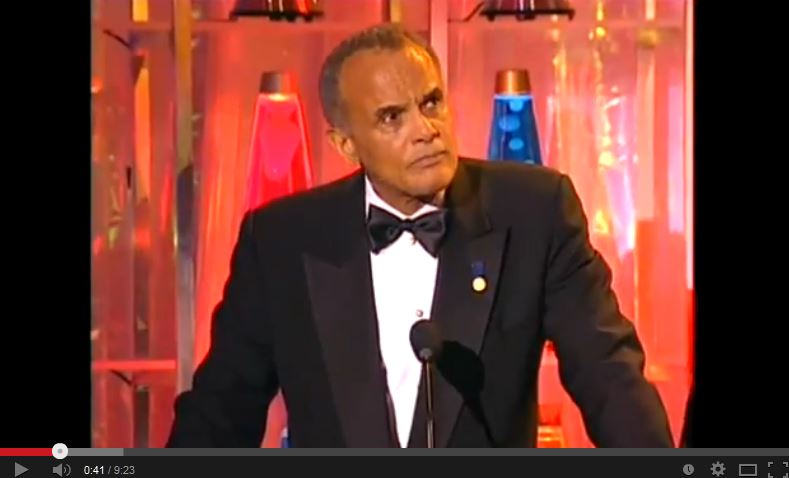- Re: When Will They Ever Learn? An Interview with Pete Seeger (David McReynolds. Staughton Lynd, Marc Beallor, Mary jo Robertiello, Wendy)
- Re: "We Shall Overcome": Honoring Pete Seeger (Daniel Millstone)
- Pete Seeger's (excellent) HUAC testimony (Mitchel Cohen)
- Keith Knight Remembers Pete Seeger - The singer/activist had a way with words.
- Harry Belafonte and Arlo Guthrie Induct Pete Seeger into the Rock and Roll Hall of Fame (Jay Schaffner)
- Pete Seeger: The Power of Song - Re-Broadcast this Friday and Saturday in New York City area - Can be viewed online
- Re: Pete Seeger had profound impact on labor movement (Liz Elkind)
- Re: In Defense of Pete Seeger, American Communist (Phyllis Mandel, David Laibman)
- Re: Costs of Privatization Hidden in Plain Sight (Judy Atkins)
- Re: Are Adjunct Professors the Fast-Food Workers of the Academic World? (Jim Young, Carol Jarboe)
- Re: Scarlett Johansson, SodaStream & the Superbowl (Linda Read)
- Vote! Guardian poll - Should Oxfam sever ties with Scarlett Johansson? (Robert Naiman)
- Re: The Anti-fracking Activist Barred From 312.5 Sq Miles of Pennsylvania (Mike Glick)
- Re: Web-Access Ruling Is a Loss for People of Color -Media Bits & Bytes - Slipping into Darkness edition (John Crawford)
- Re: Alive Inside: How the Magic of Music Proves Therapeutic for Patients with Alzheimer's and Dementia (Maria Mello)
- Union leaders arrested at Aeroflot - urgent action appeal (Eric Lee)
- The Left Front: Radical Art in the "Red Decade - Chicago area exhibit - until June 22
- Morrie Turner Presente! - Pioneering African American Cartoonist Dies at 90
- Book Review - BOHEMIANS: A Graphic History
- Today in History - 1968 - Tet Offensive Begins
Re: When Will They Ever Learn? An Interview with Pete Seeger
Let me add a short preface to this post from Portside. On a trip to Japan some years ago I was taken to a school on the outskirts of whatever city it was we were in, and as we went up the hill I could hear "We Shall Overcome" being sung in perfect English - I assumed there must be a group of Americans at the school. But no, all the students were Japanese. They had taken the great universal anthem which Pete Seeger had made so popular, and were singing it without a hint of accent.
What struck me about Seeger (whom I never met in person, though we had some correspondence) was not only his remarkable ability to get the entire audience to join him - to really join him in singing - it was also that he seemed to have discovered some trick to being forever high, forever cheerful. I wish I knew that trick but thank God someone had it.
On Pete's membership in the Communist Party, as someone who takes these things very seriously and could easily be considered one of sectarians of the Left, I think anyone who was alive and conscious in the 1930's and 1940's had to be in the Communist Party, the Socialist Party, the Trotskyist movement, an Anarchist, or a pacifist. I know how profound the differences were, how heated the debates, but taken together these groups represented a part of the struggle to redeem the human race from the dark burden of history, and the terrible possible fates of the future.
The question is not why had Pete Seeger been in the Communist Party, but how could he not be in some part of the radical community in this country? A much better question is how can corporate American justify its part in the blacklisting of Pete (and many many others) for their willingness to take the risk of dissent.
David McReynolds
====
In contrast to most other musicians, Pete Seeger had a practice of not only inviting the audience to sing with him but asking young musicians to join him on the stage.
In the summer of 1958 or 1959 I was a counselor at Camp Beacon, a summer camp near Beacon, New York run by the University Settlement House where I was a community worker. Pete and Toshi Seeger lived on a nearby mountain. And apparently there was an arrangement that Pete would come once a summer, free of course, to sing at the summer camp. He sang a song I had never heard, "We Shall Overcome." I said to myself, "I want to be part of a Movement that sings that song"
I remember him in Atlanta with a stump of wood and an axe, wanging away between lines of a song.
In Mississippi in Summer 1964 he showed up with a new song, "Oh Healing River," about the deaths of Chaney, Goodman and Schwerner.
Pete used to sing the song "One Man's Hands." Alice and I did so, too, as we drove between Youngstown and Pittsburgh. One day Alice said, "That's sexist!" She suggested that the song begin, "Just my hands/Just your hands/Can't tear a prison down," etc. We wrote to Pete about it. In the next edition of his songbook it appeared with the new words!
Staughton Lynd
====
My extreme appreciation to the Portside Moderator who chose these two gems to memorialize the great and immortal Pete Seeger. The Facebook posting by Arlo Guthrie is so moving and so right. The interview by John W. Whitehead revealed a side of Pete I hadn't known. Reading Pete's comments on socialism and democracy, I couldn't help but think back to the review I did last week of "Imagine: Living in a Socialist USA". Were I to re-do that review, I might have added that the Whitehead/Seeger interview would have been a marvelous additional chapter. In that interview, Seeger covered the issue of socialism and democracy like only Pete Seeger could:
"Any darn fool can make something complex; it takes a genius to make something simple. - Pete Seeger"
Marc Beallor
====
A big hearted man for a big hearted church.
Mary jo Robertiello
====
Have you heard that there's a movement afoot to have the new Tappan Zee bridge named after Pete-it got a lot of attention on the TV news last night and I think it's totally great.
wendy
Re: "We Shall Overcome": Honoring Pete Seeger
The woman who wrote the original song was not an anonymous protester. She was a Baptist choir director and civil rights activist named Louise Shropshire. She published the song in the 1940s and copyrighted it
Daniel Millstone
Posted on Portside's Facebook page
Pete Seeger's (excellent) HUAC testimony
Here's the original AP report, August 18, 1955, re-circulated this morning by the Associated Press via the very widely read Earthlink News. Among other things, it reveals the insanity of the McCarthy era of Pete Seeger's standup role. (His defense? The First Amendment, the right to freely and peaceably associate with whomever he likes.)
Mitchel Cohen
Keith Knight Remembers Pete Seeger
The singer/activist had a way with words.

AlterNet Comics
January 30, 2014
Harry Belafonte and Arlo Guthrie Induct Pete Seeger into the Rock and Roll Hall of Fame
In 1996, Pete Seeger was inducted into the Rock and Roll Hall of Fame. Listen to Harry Belafonte's introduction. He weaves in the history of music and struggle, the civil rights movement, peace movement, and the labor movement. He talks about the McCarthy era, when he, Seeger and many others were blacklisted. But mostly he reminds us that Pete was a remarkable and inspiring presence on this earth.
The bio that is now up on the site of the Rock and Roll Hall of Fame is a real tribute to Pete Seeger - peoples' champion, troubadour of the oppressed, peace and environmental clarion, musician and folk singer par par excellence, and his politics. He was a socialist until his death, a member of the Advisory Board of the Committees of Correspondence for Democracy and Socialism, a former member of the Communist Party, who stood up to HUAC - and won.
Harry Belafonte and Arlo Guthrie Induct Pete Seeger into the Rock and Roll Hall of Fame
Jay Schaffner
THIRTEEN and American Masters present a special in memoriam broadcast of the 2008 documentary Pete Seeger: The Power of Song, Friday, January 31, at 10:30 p.m and Saturday, February 1st at 2 p.m.
This film documents how the Seeger helped introduce America to its own musical heritage, devoting his life to using the power of song as a force for social change. Standing strong for deeply-held beliefs, Seeger went from the top of the pop charts to the top of the blacklist and was banned from American commercial television for more than 17 years. This determined singer/songwriter made his voice heard and encouraged the people of the world to sing out with him.
Re: Pete Seeger had profound impact on labor movement
(posted on Portside Labor)
An album I still have! He also had a profound impact on people not involved in the labor (and labour) movement, helping to build solidarity around workers' rights.
Liz Elkind
Posted on Portside's Facebook page
Re: In Defense of Pete Seeger, American Communist
I am curious as to how you can say Pete Seeger was a Communist, when he definitively left the CP years ago. It's my understanding of Marxism that in order to be a communist, one must be a member of a Communist Party.
Phyllis Mandel
====
Bhaskar Sundara writes: "It's not that (Pete) Seeger did a lot of good despite his longtime ties to the Communist Party; he did a lot of good because he was a Communist." The point is "not to apologize for the moral and social catastrophe that was state socialism in the 20th century, but rather to draw a distinction between the role of Communists when in power and when in opposition."
This sounds good at first: Pete was great, "not despite but because...", etc.
It feeds, however, into a Manichean dualism: "state socialism" was everything the McCarthyites said it was: totalitarian, brutal, etc. The "other" Communism was that of the local rank-and-files, in any country where Communists did not hold state power. And that Communism was, well -- charming.
In other words, Pete (and other red folks on the ground in the USA) were lovely dupes! If you are fabulous when you fight the good fight, but the situation swings 180 degrees as soon as you take power, then it is not the capitalist ruling class, but the state -- power itself -- that is the enemy. Moreover, all of the good you do is fatally compromised by this inevitable logic: if you win, you turn into the opposite of what you fight for. This is implicit, but fairly classical, anarchism.
And it is historically (factually) incorrect. First, left movements out of power, including those in which Pete Seeger participated and including many that are or were ideologically anti-communist, have exhibited many undemocratic, authoritarian and bureaucratic tendencies. They have been, like everything else, deeply historical, the product of their times and their past. Second, the record of "state socialist" regimes in the 20th century ("state" socialism: what other kind is there?) is an intense combination of the repressive and the liberatory, of enormous social progress -- including in the decisive areas of democratic and participatory values and institutions -- weighted with the authoritarianism, privilege and abuse of power coming down from centuries, and exacerbated by isolation, war, and aggression from outside. If all you can see in the 20th-century "state socialist" regimes is one big "moral and social catastrophe," then you simply don't begin to grasp the complexity of the tasks facing us all, or the continuing need for us to grapple with the intimate connections between past, present and future.
I suppose a "good communists/bad communists" view of the world is better than one that doesn't even recognize or support the pro-labor, anti-racist, pro-peace activism of the locals. But, at bottom, Sunkara's position converges with the one he cites, from Matthews in the Washington Post.
David Laibman
Editor, Science & Society
Re: Costs of Privatization Hidden in Plain Sight
Thank you Ellen Dannin for your clear and useful descriptions of the problems of privatization for cities and towns. Your article got me thinking.
Why do they privatize? Besides the immediate goal of wanting to bring in large pots of money to the strapped city budgets, and not thinking long term, some city leaders subscribe to the idea that a smaller city government is a desirable goal. Fewer departments, and fewer workers and less public works are seen by elected officials as what they believe were elected to do.
The job of pointing out the errors in this plan falls to some really aware citizens, who have learned from previous bad experiences, or who like the occupy movement have an understanding and defense of "the commons." or unions, especially public sector unions who may be hampered by the fear that "the public" will see their efforts and merely a defense of their jobs.
I would hope that public sector unions would see a well served public as their allies and not be fearful of public opinion. I believe most workers want to do a good job, and are frustrated by obstacles placed in the way of performing at their best. It is a problem that city workers are not listened to when they are the ones who really know their jobs.
Of course the strongest movement to stop privatization would be if all three of these elements could get together, and see the links and work toward a goal of a better run, more humane and equal, livable city with good jobs and opportunities.
Judith Atkins
Re: Are Adjunct Professors the Fast-Food Workers of the Academic World?
James Hoff's brief piece on the unfairness of the burgeoning reliance on adjunct faculty in less-than-elite schools hits several nails on the head and hints correctly that the problem began with the prejudices and values of the leaders of society at large. As Lincoln Steffens demonstrated over a century ago, the corruption of an institution -- a church, a government, a school -- almost always begins at the top and radiates outward and downward in pursuit of more money and/or power for those in charge. Academic institutions are exposed to much the same temptations at the top as afflict other corporations; we should be disgusted, but not surprised, by their behavior.
Jim Young
Harrisburg, PA
====
As an adjunct for the past 8 years with 3 different colleges, I have some objections to Mr. Hoff's article. I NEVER stint my students. This is my job, and I give it my all. My students do not suffer because I don't get paid what full-time professors make. I also don't think that many of my fellow adjuncts feel that way either. And I would love to make $2000+ per class. Can he tell me where? I make $1495 per class! Plus, the full-time professors at my Community College start at $33,000. In the other one I taught at in Texas, they started at $48,000 and the adjuncts were paid $1895 per class. I teach for the love of teaching. Pay me more and give me benefits would be great, but my age and education preclude being hired anywhere else but academia. And when full-time jobs do become available, they want the ones just out of college--not those of us with the experience and know-how and who the deans would probably prefer. So, Mr. Hoff needs to apologize to the myriad adjuncts who do put in the time and effort despite their classes, do not teach substandard. It has been my experience that some of those high-handed research professors are the ones who are sub-standard, caring only for their also sub-standard research because of our "publish or perish" higher education system. He is making sweeping generalizations about the adjunct instructors. But we are the cannon fodder.
Carol Jarboe
Re: Scarlett Johansson, SodaStream & the Superbowl
So the paycheck for being the voice of Siri in "Her" wasn't enough? Soda Stream--is crap anyway.
Linda Read
Posted on Portside's Facebook page
Vote! Guardian poll - Should Oxfam sever ties with Scarlett Johansson?
#NoScarJo: should Oxfam sever ties with Scarlett Johansson? Scarlett Johansson's deal with an Israeli company working in the West Bank could hurt Oxfam's brand. Should the NGO end its relationship with the actress? Take the poll
Robert Naiman
Policy Director
Just Foreign Policy
naiman@justforeignpolicy.org
Re: The Anti-fracking Activist Barred From 312.5 Sq Miles of Pennsylvania
Outrageous! Truly fascistic.
Mike Glick
Posted on Portside's Facebook page
I hope we can hear more about Rashad Robinson's note on web access, particularly in its discriminatory potential. This is a critically important subject. Can we get more background and analysis?
John Crawford
Very true - have a parent with dementia and music is magic.
Maria Mello
Posted on Portside's Facebook page
Union leaders arrested at Aeroflot - urgent action appeal

Three leaders of the pilots union at Russian airline AEROFLOT -- Alexei Shlyapnokov, Valeriy Pimoshenko and Sergei Knyshov -- were arrested in October during a bitter fight to secure a collective bargaining agreement.
Their union believes that the three were framed as a retaliation for the union's recent success in a court battle.
The Confederation of Labour of Russia (KTR), a national trade union center affiliated with the International Trade Union Confederation, and the Sheremetevo Trade Union of Airline Pilots have called for an international campaign to demand that the company negotiate rather than try to jail union leaders.
Please take a moment to show your support - click here.
Thank you -- and please spread the word!
Eric Lee
The Left Front: Radical Art in the "Red Decade - Chicago area exhibit - until June 22
I wanted you to know about a really important exhibition at the Block Museum of Art in Evanston, The Left Front: Radical Art in the "Red Decade," 1929-1940.
In the write-up on the show, the curators state that the exhibition revisits a moment in American history when visual artists joined forces to make socially conscious art. Organized by the Block Museum, the exhibition explores the visual culture of the John Reed Club and the American Artists' Congress through prints, drawings, paintings, and publications.
Please alert artist friends and others--this was such a breath of fresh air! **The show runs through June 22nd.
Mark Rogovin
The Rogovin Collection
Morrie Turner Presente! - Pioneering African American Cartoonist Dies at 90
Morrie Turner 1923 - 2014
Morris "Morrie" Turner was a black-American syndicated cartoonist, creator of the strip Wee Pals. Turner was the first nationally syndicated African-American cartoonist.
Morrie Turner Dies at 90; Broke Race Barriers in Comics New York Times obituary

credit - Keith Knight / Cartoon: Soul Corner / Daily Kos
Book Review - BOHEMIANS: A Graphic History
BOHEMIANS
A Graphic History
edited by Paul Buhle , David Berger
Publisher:Verso
Page count:304pp
ISBN:978-1-78168-261-6
Pub Date:April 15th, 2014
Kirkus Review
Posted Online:Jan. 29th, 2014
Kirkus Reviews Issue:Feb. 15th, 2014

What do Walt Whitman, Josephine Baker and Woody Guthrie have in common? Here, their lives are interwoven with the artistic and cultural movements of the 19th and 20th centuries, all under the umbrella of "bohemianism."
Brooklyn-based writer Berger and prolific graphic-arts editor Buhle (A People's History of American Empire: A Graphic Adaptation, 2008, etc.) make fine selections in this thoughtful successor to Harvey Pekar's The Beats: A Graphic History (2009). In a thorough introduction, Buhle explains the roots of the idea of bohemianism: The real Bohemia, a geographical entity eventually swallowed up by the Czech Republic, was misidentified by French journalists as the source of Europe's gypsy culture. But Berger and Buhle focus more on those remarkable individuals and movements whose artistic and political spirits ran contrary to the traditions of their times. The writers get the most attention, with stories devoted to spiritual comrades Whitman, Oscar Wilde and Henry Miller, among others. Two very different stories examine the grace of dancer Baker and the beautiful, messy story of Billie Holiday and the song "Strange Fruit." Other chapters combine stories to capture the origins of cultural movements, such as "Art and the Artist," which portrays the arrival of modern art in New York in 1915 in astonishing detail. Other chapters summarize the arcs of the labor movement, modern dance and the earliest seeds of the folk music movement, represented here by Guthrie. All of the art is bold and visually distinct; fittingly, many of the artists have deep roots in the underground comics scene-e.g., Peter Kuper. A truly poignant coda by cartoonist Mark Crilley imagines a young Pekar and R. Crumb spending a day together in Cleveland, visiting record and book stores, talking shop and lamenting the paving over of the old world.
A terrific appraisal of culture's gypsies, tramps and thieves, worthy of the editors' judgment: "Obituaries for bohemia have, in short, always been premature."
Today in History - 1968 - Tet Offensive Begins
Four-star General Vo Nguyen Giap led Vietnam's armies from their inception, in the 1940s, up to the moment of their triumphant entrance into Saigon in 1975.
Possessing one of the finest military minds of this century, his strategy for vanquishing superior opponents was not to simply outmaneuver them in the field but to undermine their resolve by inflicting demoralizing political defeats with his bold tactics.
This was evidenced as early as 1944, when Giap sent his minuscule force against French outpost in Indochina. The moment he chose to attack was Christmas Eve. More devastatingly, in 1954 at a place called Dien Bien Phu, Giap lured the overconfident French into a turning point battle and won a stunning victory with brilliant deployments. Always he showed a great talent for approaching his enemy's strengths as if they were exploitable weaknesses.
Nearly a quarter of a century later, in 1968, the General launched a major surprise offensive against American and South Vietnamese forces on the eve of the lunar New Year celebrations. Province capitals throughout the country were seized, garrisons simultaneously attacked and, perhaps most shockingly, in Saigon the U.S. Embassy was invaded. The cost in North Vietnamese casualties was tremendous but the gambit produced a pivotal media disaster for the White House and the presidency of Lyndon Johnson. Giap's strategy toppled the American commander in chief. It turned the tide of the war and sealed the General's fame as the dominant military genius of the 20th Century's second half.
John Colvin author of "Giap Volcano Under Snow"
This article appeared in the Vietnam Experience
Boston Publishing Company
re-posting on Vets With A Mission




Spread the word